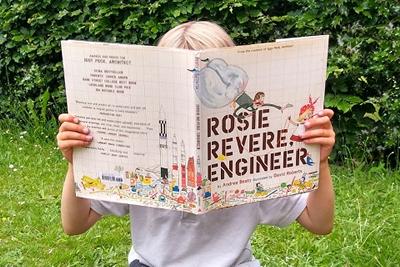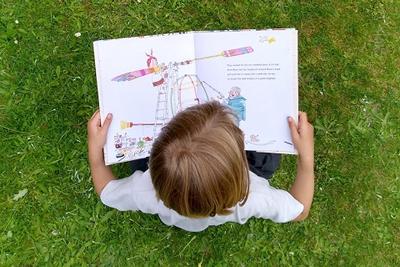Inclusive Southampton book programme inspires diverse new generation of problem-solving engineers

Primary school pupils are nurturing positive and inclusive perceptions about engineering through the growing impact of an outreach programme at the University of Southampton.
The Infant Engineer book programme reached hundreds of school classes in 2016 to challenge children’s preconceptions around the role of women in engineering. Five years on, its founder says the simple and highly scalable programme is having a mounting impact in the city.
The number of women in the UK engineering workforce remains under 10 percent despite numerous initiatives taken by industry and educational institutions; the gender balance in the profession remains one of the worst in Europe.
The proportion of female undergraduates within many undergraduate engineering programmes is similarly low. Research shows that women who pursue Science, Technology, Engineering and Mathematics (STEM) subjects are every bit as proficient as men, but that many female students with appropriate potential are put off, or even do not consider engineering, because of social factors.
The Infant Engineer programme donated copies of a specially-selected story book and related learning resources to 158 classes in the 36 Southampton City Council primary schools. The initiative is timed with International Women in Engineering Day, which takes place annually on 23rd June.

‘Rosie Revere, Engineer’ by Andrea Beaty is a story about a young inventor who sees inspiration in the most unlikely objects. The book helps to address two aspects of engineering’s image problem by providing a female lead character and by representing engineering fundamentally as a creative problem-solving activity and not centrally about maths or machinery. Each book is prefaced with a personal message to the reader from Professor Dame Ann Dowling, first female President of the Royal Academy of Engineering.
Dr Ed Richardson, who initiated the scheme, says: “The Infant Engineer programme is extremely simple and yet effective. Thanks to the enthusiasm and efforts of primary school teachers, the small act of sharing a positive story can help to shape how very large numbers of children learn to view engineering. Improving perceptions about engineering will benefit all children and all of engineering in the UK.”
The first schools in the initiative are reporting persistent and substantial impact from this simple and highly scalable intervention.
The Infant Engineer programme has inspired an annual ‘Engineers make a world of difference’ week at Portswood Primary School that is engaging a further 90 nine-to-ten year olds this week.
Year 5 teacher Amy Hotston explains: “We have had brilliant feedback from all partners since we started the week of learning in 2017. There is always a day in the week themed around the book where we link it to Rosie the Riveter and women's instrumental role in engineering during the war effort. Children love the book as an easy hook into understanding women's importance in engineering history and the future of the job.
“Each year, we share statistics of the percentages of women in engineering roles compared to men. The children are always shocked. I think that it is important for us to present these roles inclusively for the children as often the stereotypes are so ingrained the children don't even realise they have them.”
The University of Southampton’s School of Engineering holds an Athena SWAN Bronze award, which recognises its commitment to tackling gender inequality.
Dr Richardson adds: “Substantial STEM outreach effort has been focussed on female secondary school students, however far less effort has been expended on influencing conceptions of engineering and gender in much younger children. Young children are still picking up very limiting messages about what kinds of things are appropriate for girls and boys – from books, from toys, from marketing and from the adults around them.
“Shifting the messages given to young children is a formidable but essential task, and I am thrilled to see that Infant Engineer is making a difference.”
For more information about the initiative, visit the Infant Engineer programme page.